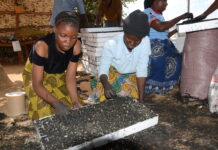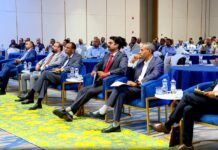During the World Economic Forum on Africa, Startupbootcamp (SBC) Afritech, a leading accelerator focused on innovative African tech start-ups, together with SAP Next-Gen, a purpose-driven innovation university and community, hosted a series of conversations around the Sustainable Development Goals (SDGs). The aim: to explore how innovation can facilitate and accelerate the achievement of the SDGs.
Kicking off the trio of talks was a discussion on Public–Private Partnerships for the Global Goals by a panel comprising Matthew Jennings, SAP Global Vice President for Intelligent Enterprise Solutions; Sandiso Sibisi, Founder of COOi Studios; Julie Cleverdon, Director of the Cape Town Science Centre; Lance Greyling, Director of Enterprise and Investment at the City of Cape Town, Philip Kiracofe, CEO of Startupbootcamp and Christoph Viaraud, CEO and Chairman of AfricaArena. During the conversation, panellists shared on how partnerships could be harnessed to foster the advancement of the SDGs.
Looking specifically at SDG 9, which entails building resilient infrastructure, promoting inclusive and sustainable industrialisation as well as fostering innovation, Sibisi said: “While it takes effort for corporates to work with startups, if no one is going to go that mile and work with them, they will never unpack the value that startups provide. This includes having access to pre-built solutions that have been tried and tested as well as an entry point to new markets. If you look at the big startups in Silicon Valley like Google and Facebook, they are all built on acquisitions of smaller startups. By working with them, corporates give startups market access whilst fostering innovation within their own organisations.”
With education being a key concern on the continent and forming part of SDG 4 – ensuring inclusive and equitable quality education as well as promoting lifelong learning opportunities for all – Cleverdon added: “There are a lot of educational startups that are coming up with great programmes and great things to really capture the attention of kids and get them to learn. I think that it is crucial that the Department of Education knows about these startups and brings them into the schools because these initiatives can respond quickly to the needs of the children.”
Day two of the talks saw panellists Rudeon Snell, Director of Intelligent Enterprise Solutions for Southern EMEA at SAP; Danai Musandu, Investment Associate at Goodwell Investments; Philani Mdingi, Founder and Director of Digital Strategy at Maverick Mind; Thiru Pillay, Managing Director of Deloitte Consulting in Africa and Natalie R, Founder of Robots Can Think, tackling the topic of Innovation with Purpose. In the course of the discussion on African-led innovation driving positive impact for the African continent, Mdingi shared: “Purpose-driven innovation for me, as an entrepreneur running a small business, in a nutshell, is to be very clear about the society we live in and to make a big contribution the best way we can. For example, we came up with a platform called Tech for Good that enabled other companies to help kids in schools to have access to technology through the donation of used laptops and tablets.”
Musandu weighed in on what factors are effecting purpose-driven innovation, saying: “We need to be cognitive of the fact that, as we innovate further, there need to be more people who are part of the conversation so that we don’t end up having a centralised place from which innovation comes from. As excited as we are about innovation, we need to ensure that we have enough players around the table so that there is an equitable way of looking at that innovation rather than just a single perspective.”
The conversations concluded with a discussion on Digital Skills for the Global Goals amongst Dean McCoubrey, Founder of MySociaLife; Richard Perez, Director of the HPI Dschool; Ulrike Rivett, Director of the School of IT at the University of Cape Town; Gugu Nonjinge from Afrobarometer Communications and Mervyn George, Innovation Strategist at SAP. Answering the question ‘does everyone within the African context need to learn digital skills?’, Nonjinge responded: “Definitely! The lack of digital skills in Africa is playing out through the way our leaders and governments are ruling our respective countries, for example the internet shutdowns we have been having across the continent. This boils down to the basic understanding of connectivity and civil liberties which our governments do not have. Everyone should have basic knowledge and be equipped.”
Sharing on how digital skills can be used to advance the SDGs today, George said: “I believe that access, fibre infrastructure and content being placed on easily accessible digital platforms can help to achieve SDG 4 – ensuring inclusive and equitable quality education as well as promoting lifelong learning opportunities for all. As the digital skills advance, this will have an impact on SDG 1, the end of poverty in all its forms everywhere.”
Motlhabane Koloi, Legal and Scouting Manager and SBC AfriTech Lead for SDG Initiatives brought the talks to a close by saying: “I believe that the discussions we held over the past three days have been a pivotal starting point for exploring how, together, we can harness innovation to achieve the SDGs and, simultaneously, many of the outcomes of the World Economic Forum on Africa.” He will be attending the United Nations General Assembly on the 24th of September 2019 where he will be recognised as a Global Goalkeeper.
For more information, go to https://www.startupbootcamp.org/accelerator/afritech.








